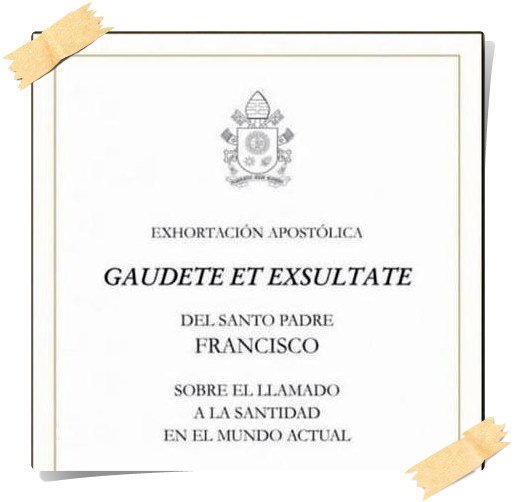Hindrances to Holiness
(This is the second treatment of Pope Francis’ Gaudete et Exultate)
Chapter 2 of Pope Francis’ third apostolic exhortation, Gaudete et Exultate, tackles two central challenges to holiness: contemporary gnosticism and contemporary pelagianism. Before addressing them and their intersection with Salesian spirituality, a brief comment on this second section of this document on holiness is in order.
In contemporary Christian spirituality, threats to holiness are frequently discussed as sins, and a listing of moral potholes are mapped out to be avoided on the path to holiness. Pope Francis offers no such spiritual cartography. Rather, he discusses two pervasive world views that could blind a disciple to seeing how central God, grace, and charity are to holiness itself. Recall from Chapter 1, that holiness is not a deep piety, sustained spiritual silence, or self-effacing humility. Holiness is understood in disciples “by the depth of their charity” (no. 37), or as the present pontiff quoted his predecessor, holiness is nothing more than “charity lived to the full” (no. 24).
While sin does, of course, counter holiness, certain world views or perspectives—more than any actual sin, the pope is asserting—are especially dangerous to the pursuit of holiness. A sound spirituality, then, is a certain remedy to any holiness-hindering viewpoint, and Salesian spirituality, especially with its relational moorings and celebration of the humanity of the person, could be ideal in quelling the pulls of modern gnosticism and pelagianism.
Francis describes the modern gnostics as people who
think that their explanations can make the entirety of the faith and the Gospel perfectly comprehensible. They absolutize their own theories and force others to submit to their way of thinking. A healthy and humble use of reason in order to reflect on the theological and moral teaching of the Gospel is one thing. It is another to reduce Jesus’ teaching to a cold and harsh logic that seeks to dominate everything (no. 39).
The pope goes on to warn believers to avoid these people: “When somebody has an answer for every question, it is a sign that they are not on the right road” (no. 41). Here, such people are presuming grace or not allowing for the transcendence of God to manifest itself in mercy: “Even when someone’s life appears completely wrecked, even when we see it devastated by vices or addictions, God is present there” (no. 42).
St. Francis de Sales’ utter optimism in the power of God and the undying belief in God’s unwillingness to abandon any disciple are evident as balms of grace to detonate the bombs of disordered thinking that can destroy a soul’s way of experiencing love. DeSales believed that the goodness of the person is larger and stronger than any capacity for sin. For this reason, he advises living in the presence of God so as to tap into that goodness and make choices, with deliberation, from grace. Thus, his ever-simple Direction of Intention prayer that brings each of the believer’s actions, no matter how small or significant, into the presence of divine love.
The second threat to holiness discussed in Gaudete et Exultate is pelagianism, which is the tendency to “ultimately trust only in their own powers and feel superior to others because they observe certain rules or remain intransigently faithful to a particular Catholic style” (no. 49). It is the grace of God, along with our ability and willingness to cooperate with God’s grace—which is itself a grace!—that moves us to love and thank God for the blessings of our lives.
Here, Pope Francis discusses the many limitations of shortcomings that every person possesses. Images of the pope going to confession and his recent strong apologies for his failure in responding to issues related to clergy sexual abuse in South America illustrate powerfully his own acknowledgment of both sin and wrongdoing in his life and as the leader of the church. Similarly, DeSales calls all disciples to love their abjections, those areas of personal weakness from which failure ensues. These, he teaches, are opportunities to experience the grace of God that can advance us in holiness—charity—as we experience the same grace that God gives to those in our lives whom we may judge, dismiss, disrespect, or dislike. Indeed, all are part of the same human family, blessed and redeemed by Jesus.
Pelagianism, the pope warns, is alive and surging throughout the church, even among those who possess high offices or degrees of theological learning. Pelagianists, he writes:
give excessive importance to certain rules, customs or ways of acting. The Gospel then tends to be reduced and constricted, deprived of its simplicity, allure and savour. This may well be a subtle form of pelagianism, for it appears to subject the life of grace to certain human structures. It can affect groups, movements and communities, and it explains why so often they begin with an intense life in the Spirit, only to end up fossilized...or corrupt (no. 58).
Pope Francis has elsewhere frequently spoken against rigidity or legalism. In this document he derides “obsession with the law, an absorption with social and political advantages, a punctilious concern for the church’s liturgy, doctrine, and prestige, and a vanity about the ability to manage practical matters” (no. 57). DeSales’ repeated calls to be gentle and patient with others and especially ourselves directly counter such narrow and corrosive tendencies. In The Introduction to the Devout Life, he reminds the reader that, after sin, anxiety is the greatest challenge for the soul. With a foreshadowing eye on the anxieties that the pope outlines here, DeSales' advice is spot-on.
(Editor’s note: Last week’s DeSales Weekly incorrectly credited Pope Paul VI with naming St. Francis de Sales a doctor of the church. In fact, Pope Pius IX afforded DeSales this honor in 1877. The editor thanks those who helped him love his abjection in this matter.)




